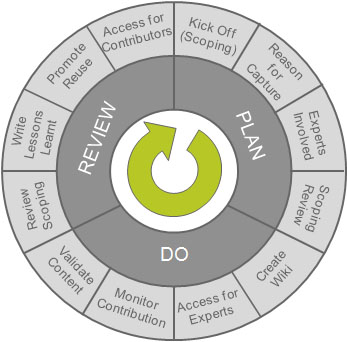
Business Expertise
Long gone are the days when reference books and manuals sat on your desk; knowledge is constantly evolving and being updated. When you need to find information you want to find it quickly and easily, from a reliable, validated source and know that you are looking at the most recent version.
Business Expertise provides an effective and uncomplicated method for capturing, sharing and reusing knowledge, and delivers the right knowledge to the right people in the right format first time.
How does it work?
Our methodology has evolved over many years and ensures that the process occurs smoothly and completely, avoiding common pitfalls. It is based on a simple plan-do-review cycle:

Plan: A business case is created which establishes the purpose and reason for the activity. It defines the scope and depth of knowledge and identifies all participants such as the experts to interview and the target audience. From this a project plan is created which identifies the process, costs, benefits and risks; all concerns and expectations are taken into consideration. This is captured in a scoping document.
A scoping review is then held to finalise the business case, and to evaluate the outcome of the planning stage. It is key to the success of the process and provides a completed scoping document.
Do: The wiki or space is created to receive the information, and the appropriate access rights granted.
Expert's knowledge will be captured by interview, or by self-documentation. This information will then be structured and validated, and where gaps are found, or the information is unclear further acquisition and structure will occur. This cycle is completed by a final validation of the structure and content by a recognised expert.
A facilitator will monitor the contribution and ensure that the objectives, as set out in the scoping document, are being fulfilled. This is then reviewed via the approval process, which forms part of the final validation.
Review: The output of the activity is reviewed to ensure it fulfils the requirements as defined in the scoping document. Furthermore any lessons learnt are recorded to aid future processes. The target audience are granted access rights and the use and reuse of the information is encouraged via promotions.
Key benefits
- One resource available to all; less time is spent finding the right manual, form or document as they are contained in a single location, and easily searched.
- Processes, methods and knowledge are captured which reduces the reliance on key experts for training and retraining, allowing them to focus on their main role.
- Key knowledge is retained within the domain, reducing the business risk.
- The knowledge is placed in context, aiding understanding and reducing the learning curve; the end user can learn at their own rate. Large amounts of information are broken down into smaller manageable small chunks easing use, sharing and maintenance.
- Structured acquisition process applied to ensure the completeness of the knowledge captured, extracting even tacit knowledge during interviews; inconsistencies, gaps and weaknesses in the knowledge can be easily detected and rectified.
- Project control at every step, from the initial planning stages through to review, ensuring project success.
How we can help
hut31 can support you throughout the entire project life cycle and provide comprehensive training, support and the latest tools via our wiki services.
We can provide refresher training, critical analysis of your captured knowledge, and support and advise on how to improve your current KM practices.
We can even perform the whole process on your behalf; interviewing your experts, structuring your knowledge, analysing your existing information and supplying it on a system ready for you to benefit from our methodology and experience.
